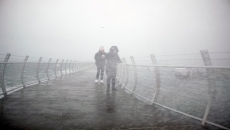VANCOUVER — Janice Pang was in Grade 8 when she designed an experiment exposing ravenous immune cells — called macrophages, for the uninitiated — to bacterial components to test their appetite.
In Grade 9, the teen elegantly demonstrated the contribution of white blood cells to inflammation in Type 2 diabetes. Now in Grade 11, Pang is showing for the first time that two particular micro-sized molecules may be used to identify the disease at an earlier stage.
The 17-year-old is doing work at a master's level of education while in attendance at Pinetree Secondary School in Coquitlam, B.C., and she's not the only high school student whose science smarts surpass expectations.
Pang is one of 12 Canadian students selected to showcase her research in May at the world's most prestigious science fair, among an array of high-calibre projects that leapfrog pencils-and-Petri-dish learning.
Revolutions in education, spurred by technology and business needs, have coupled with swift and easy access to near limitless information over the Internet, say educators. Development of what's possible has accelerated not only for professionals, but young adults who perhaps haven't yet decided what they want to be when they grow up.
"The Internet has been a big help. You can just punch in whatever you want, right? Search on Google Scholar," said Pang, adding she believes age doesn't really factor into what someone can accomplish.
"Well, I began when I was 13. You've just got to try, and not give up."
Five students from B.C. and seven from Ontario will compete on Team Canada at the Intel International Science and Engineering Fair from May 10 to 15 in Pittsburgh, Pa.
Other projects by Canadian students include a disposable device that tests for HIV in 60 minutes, a system that reduces front impacts for bicycles, and a method for curbing the transmission of disease in airplanes.
Each of the students was selected for the team by Youth Science Canada after participating in a science fair at the national level.
"There is a distinct change in the quality and the focus of the work," said Patti Leigh, a teacher who founded the Science Fair Foundation B.C. in 1983.
Momentum has ramped up in terms of the level of projects produced, in tandem with the shift in prominence given to certain subjects, she said. Thirty years ago, the focus was on life sciences and biology, whereas technology and health sciences are now at the fore.
Duncan Stothers, 17, said he would definitely like to think he's helping push the boundaries of what's possible.
The Vancouver teen, who attends St. George's School, made the team based on his invention — a modified bike frame that's up to 90 per cent safer in a front collision. His design tweaks technology hardly altered over the past 100 years.
"Some researchers push the boundaries in medicine, which helps the engineers live longer. And then the engineers might create a safer automobile, which might help the biologists live more safely," he said.
"All these fields feed off each other, and I think that's what creates the accelerating rate at which we're learning things.
"But, the more the boundaries are pushed, the more questions come up as well."
Education Prof. Don Krug said the evolution of science fairs can be partially attributed to students' access to new content.
Wireless communication has also influenced how students learn, he said. They're much less interested in working alone, and even collaborating with just their teacher has gone by the wayside.
"They're collaborating with other people who are out there that they can contact and ask questions," said the University of British Columbia professor in the department of curriculum and pedagogy.
"It might be their peers, but it might be other people they find in a chat room or online in some type of a forum that has specific information on what they're looking for.
"(It's) the idea that we are smarter together than we are by ourselves."





